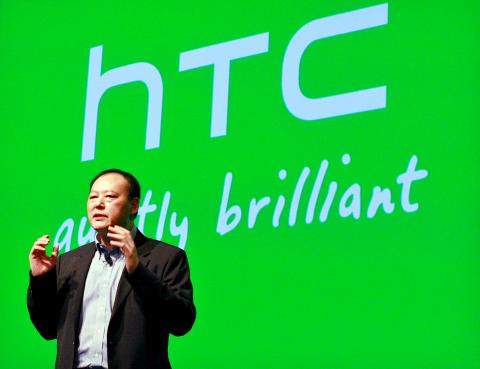Finnish handset maker Nokia Oyj will have a better chance than Taiwan-based HTC Corp (宏達電) of succeeding in China’s Windows Phone 8 (WP8) market thanks to its better product portfolio, research firm Gartner Inc said recently.
Although HTC is expanding its retail presence and is improving its relationships with Chinese carriers, Nokia’s partnership with Microsoft Corp will give it an edge in selling WP8 phones, said Roger Sheng, a Shanghai-based research analyst at Gartner.
“It’s not just about the number of distribution channels but also the product portfolio,” Sheng told reporters.

Photo: Reuters
Since Nokia has bet on the Windows software to revive its sales, the company will definitely launch new models covering the full pricing spectrum, from entry-level models costing US$150 to high-end phones priced at US$600, Sheng said.
“HTC still focuses on the Android system rather than Windows, indicating that it has devoted less manpower to the Windows platform and will have a weaker product portfolio than Nokia,” he added.
Moreover, Nokia is expected to receive subsidies from Microsoft for its WP8 marketing expenses and royalty payment obligations, while HTC still needs to pay Microsoft royalties, Sheng said.
Once the largest mobile phone makers in China, Nokia is also expected to promote its new Windows models in China more effectively than HTC, given the Finnish maker’s solid relationships with distributors and telecoms operators, the analyst said.
Nokia, which announced in February last year a broad strategic partnership with Microsoft, launched its WP8-based Lumia 920 on Sept. 7, with emphasis on its powerful “PureView” camera and built-in wireless charging. HTC also unveiled its first WP8 smartphones — the 4.3-inch HTC 8X and the 4-inch HTC 8S — in New York on Sept. 19.
The phones feature Beats audio technology and improved camera capabilities. In addition to its battle with Nokia, HTC is facing increasingly intense competition from Chinese handset makers using Google Inc’s Android operating system.
HTC is expected to remain the sixth-largest Android maker in China by taking an 8 percent market share this year, the same share it grabbed last year, according to data compiled by the Taipei-based Topology Research Institute (拓璞產業研究所).
China’s Lenovo Group (聯想) and Huawei Technologies Co (華為) will each account for 14 percent of total Android phone shipments this year, behind Samsung’s 24 percent, the institute said.
Last year, Lenovo held only a 5 percent share of Android phone shipments in China.
Chinese brand Coolpad (酷派) will likely rank fourth and see its Android market share rise from 9 percent last year to 13 percent this year, while fifth-placed ZTE Corp (中興) of China will expand from 10 percent to 11 percent, the institute predicted.

SEEKING CLARITY: Washington should not adopt measures that create uncertainties for ‘existing semiconductor investments,’ TSMC said referring to its US$165 billion in the US Taiwan Semiconductor Manufacturing Co (TSMC, 台積電) told the US that any future tariffs on Taiwanese semiconductors could reduce demand for chips and derail its pledge to increase its investment in Arizona. “New import restrictions could jeopardize current US leadership in the competitive technology industry and create uncertainties for many committed semiconductor capital projects in the US, including TSMC Arizona’s significant investment plan in Phoenix,” the chipmaker wrote in a letter to the US Department of Commerce. TSMC issued the warning in response to a solicitation for comments by the department on a possible tariff on semiconductor imports by US President Donald Trump’s

The government has launched a three-pronged strategy to attract local and international talent, aiming to position Taiwan as a new global hub following Nvidia Corp’s announcement that it has chosen Taipei as the site of its Taiwan headquarters. Nvidia cofounder and CEO Jensen Huang (黃仁勳) on Monday last week announced during his keynote speech at the Computex trade show in Taipei that the Nvidia Constellation, the company’s planned Taiwan headquarters, would be located in the Beitou-Shilin Technology Park (北投士林科技園區) in Taipei. Huang’s decision to establish a base in Taiwan is “primarily due to Taiwan’s talent pool and its strength in the semiconductor

An earnings report from semiconductor giant and artificial intelligence (AI) bellwether Nvidia Corp takes center stage for Wall Street this week, as stocks hit a speed bump of worries over US federal deficits driving up Treasury yields. US equities pulled back last week after a torrid rally, as investors turned their attention to tax and spending legislation poised to swell the US government’s US$36 trillion in debt. Long-dated US Treasury yields rose amid the fiscal worries, with the 30-year yield topping 5 percent and hitting its highest level since late 2023. Stocks were dealt another blow on Friday when US President Donald

UNCERTAINTY: Investors remain worried that trade negotiations with Washington could go poorly, given Trump’s inconsistency on tariffs in his second term, experts said The consumer confidence index this month fell for a ninth consecutive month to its lowest level in 13 months, as global trade uncertainties and tariff risks cloud Taiwan’s economic outlook, a survey released yesterday by National Central University found. The biggest decline came from the timing for stock investments, which plunged 11.82 points to 26.82, underscoring bleak investor confidence, it said. “Although the TAIEX reclaimed the 21,000-point mark after the US and China agreed to bury the hatchet for 90 days, investors remain worried that the situation would turn sour later,” said Dachrahn Wu (吳大任), director of the university’s Research Center for